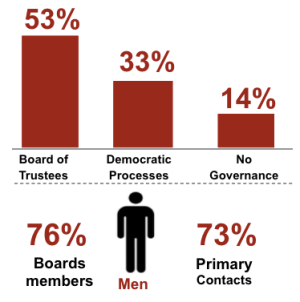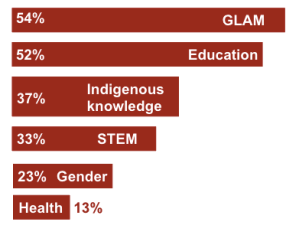Since 2018, the Affiliations committee has recognised 55 new affiliates, 36 (66%) of which came from regions of the world where the next billion internet users are expected to come from (Ang C. 2020). Each new recognition is an inspiring story of organizing under tense geopolitical and socioeconomic conditions for the new groups from Mali, Sudan, Haiti, Vietnam and Hong Kong. It’s a story of resilience and renewal for a returning group in Brazil. It’s a story of more thematic diverse international focus for new groups such as Wiki Tongues and Wiki Blind.
This makes it ever more urgent for the Wikimedia Foundation and other movement partners to better understand affiliates in order to target the support affiliates need to meet our shared vision. This survey presents the Wikimedia Foundation and the larger movement with a useful means to regularly measure progress towards common goals in the Foundation’s Medium Term Plan and the Movement’s 2030 Strategic Direction.
Affiliates are unique because they are not just organizations, or an informal group of people. As institutions they are the rules of the game that community members play by, they determine how new members are invited, how they are welcomed, what activities they will be involved in and most importantly who amongst members can rise into positions of decision making and influence.
“Affiliates organise their communities as institutions that shape community structures and cultures”
Therefore It is critical to understand and invest in affiliate institutional resilience for them to meet shared movement goals, by providing capacity development that prepares them to welcome newcomers and build structures that are more representative of the world.
Affiliates were least confident in their abilities to evolve better organizational governance and resource policies (44%), to communicate and run press relations (45%), or to host and promote contributor development activities (68%); all of which are essential capacities related to higher-level organizational development.

One indicator of a thriving movement is that anyone feels like they can grow into positions of influence in the movement, however, while affiliates are experts at engaging and supporting newcomers in the movement, like many organizations around the world, diversity in decision making roles is still limited.
Interestingly, membership in User Groups is much more representative of the global gender distribution (54% Women and 44% men) than in chapters and thematic organizations.
To address this movement-wide issue, we need to ensure Affiliate leadership have access to opportunities that will help them target gender equity in their governance structures.
“Affiliates serve their communities as public spaces in which community members meet in person and online.”
Affiliates are key drivers of community engagement for all members, not just newcomers. They are trusted sources of quality and accountability in the movement. Community members are likely to trust events, collaborations and programs that Affiliates drive, and this is key to ensure movement longevity and the diversity of content.
Affiliate members reported favourable social climate in which members feel they belong, are engaged and can collaborate. They also felt a lot more can be done by affiliates to make spaces more encouraging of free speech and overall awareness of motivations.
More importantly, Affiliates are key partners to address content gaps. Affiliates have the ability to motivate members and drive content creation in numerous areas – including those in which we do not have dedicated team support within the Wikimedia Foundation.

Affiliate members are really plugged-in on Glam and Education programs, and have steadily conducted activities that led to impressive content creation around these areas of focus. However, they need help to equally thrive in other areas of programmatic focus that will lead to diverse content creation. By also looking at providing dedicated support for marginalized or indigenous knowledge, language programs, STEM programs, as well as Gender and Health programs.
The growing COVID-19 pandemic provided a unique challenge in how we connect and collaborate across the movement. Core to the Thriving Movement goal is the ability to come together during events and convenings. Unfortunately, Affiliate members continue to display a lack of awareness of regional-organized events that bring together different groups in the same geographic region together in one place like Wiki Indaba, WikiArabia, and Iberoconf. This impacts how we grow emerging communities.
To find out more about Wikimedia affiliates, as well as full recommendations to both the Affiliations Committee and the Wikimedia Foundation, read the full report on Meta.

Can you help us translate this article?
In order for this article to reach as many people as possible we would like your help. Can you translate this article to get the message out?
Start translation